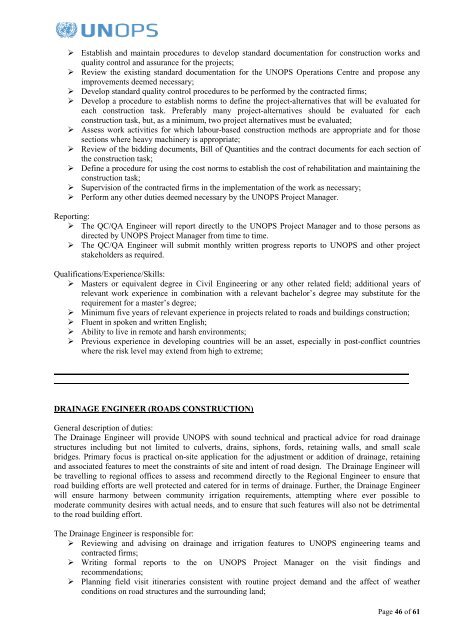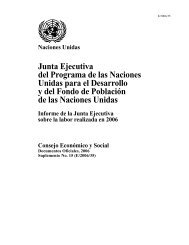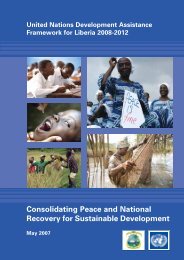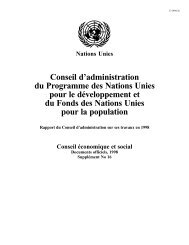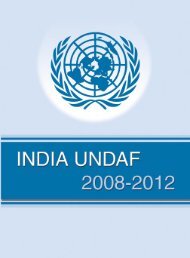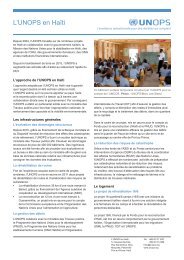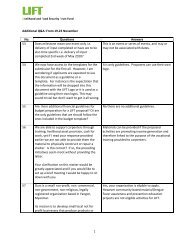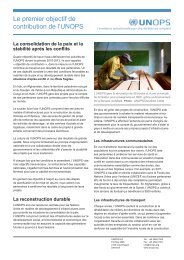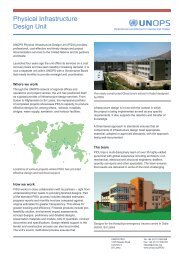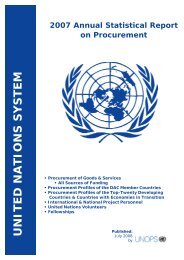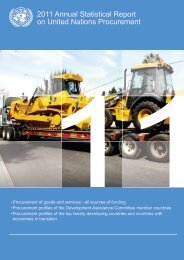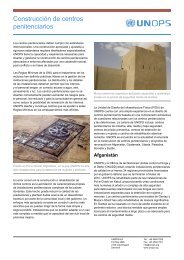ANNEX II - UNOPS
ANNEX II - UNOPS
ANNEX II - UNOPS
Create successful ePaper yourself
Turn your PDF publications into a flip-book with our unique Google optimized e-Paper software.
Establish and maintain procedures to develop standard documentation for construction works and<br />
quality control and assurance for the projects;<br />
Review the existing standard documentation for the <strong>UNOPS</strong> Operations Centre and propose any<br />
improvements deemed necessary;<br />
Develop standard quality control procedures to be performed by the contracted firms;<br />
Develop a procedure to establish norms to define the project-alternatives that will be evaluated for<br />
each construction task. Preferably many project-alternatives should be evaluated for each<br />
construction task, but, as a minimum, two project alternatives must be evaluated;<br />
Assess work activities for which labour-based construction methods are appropriate and for those<br />
sections where heavy machinery is appropriate;<br />
Review of the bidding documents, Bill of Quantities and the contract documents for each section of<br />
the construction task;<br />
Define a procedure for using the cost norms to establish the cost of rehabilitation and maintaining the<br />
construction task;<br />
Supervision of the contracted firms in the implementation of the work as necessary;<br />
Perform any other duties deemed necessary by the <strong>UNOPS</strong> Project Manager.<br />
Reporting:<br />
The QC/QA Engineer will report directly to the <strong>UNOPS</strong> Project Manager and to those persons as<br />
directed by <strong>UNOPS</strong> Project Manager from time to time.<br />
The QC/QA Engineer will submit monthly written progress reports to <strong>UNOPS</strong> and other project<br />
stakeholders as required.<br />
Qualifications/Experience/Skills:<br />
Masters or equivalent degree in Civil Engineering or any other related field; additional years of<br />
relevant work experience in combination with a relevant bachelor’s degree may substitute for the<br />
requirement for a master’s degree;<br />
Minimum five years of relevant experience in projects related to roads and buildings construction;<br />
Fluent in spoken and written English;<br />
Ability to live in remote and harsh environments;<br />
Previous experience in developing countries will be an asset, especially in post-conflict countries<br />
where the risk level may extend from high to extreme;<br />
_____________________________________________________________________________________<br />
_____________________________________________________________________________________<br />
DRAINAGE ENGINEER (ROADS CONSTRUCTION)<br />
General description of duties:<br />
The Drainage Engineer will provide <strong>UNOPS</strong> with sound technical and practical advice for road drainage<br />
structures including but not limited to culverts, drains, siphons, fords, retaining walls, and small scale<br />
bridges. Primary focus is practical on-site application for the adjustment or addition of drainage, retaining<br />
and associated features to meet the constraints of site and intent of road design. The Drainage Engineer will<br />
be travelling to regional offices to assess and recommend directly to the Regional Engineer to ensure that<br />
road building efforts are well protected and catered for in terms of drainage. Further, the Drainage Engineer<br />
will ensure harmony between community irrigation requirements, attempting where ever possible to<br />
moderate community desires with actual needs, and to ensure that such features will also not be detrimental<br />
to the road building effort.<br />
The Drainage Engineer is responsible for:<br />
Reviewing and advising on drainage and irrigation features to <strong>UNOPS</strong> engineering teams and<br />
contracted firms;<br />
Writing formal reports to the on <strong>UNOPS</strong> Project Manager on the visit findings and<br />
recommendations;<br />
Planning field visit itineraries consistent with routine project demand and the affect of weather<br />
conditions on road structures and the surrounding land;<br />
Page 46 of 61


